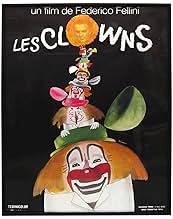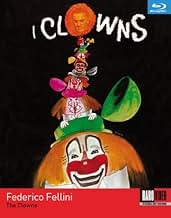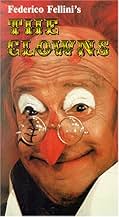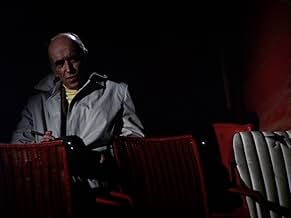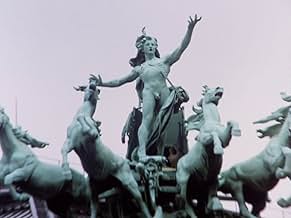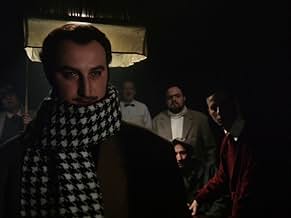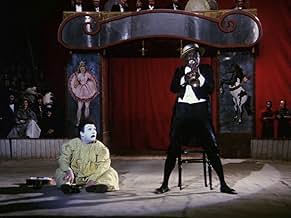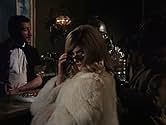CALIFICACIÓN DE IMDb
7.0/10
3.2 k
TU CALIFICACIÓN
Entrevistas con veteranos payasos europeos alternan con imaginería de Fellini.Entrevistas con veteranos payasos europeos alternan con imaginería de Fellini.Entrevistas con veteranos payasos europeos alternan con imaginería de Fellini.
- Dirección
- Guionistas
- Elenco
- Premios
- 4 premios ganados y 2 nominaciones en total
Riccardo Billi
- Clown
- (as Billi)
Gigi Reder
- Clown
- (as Reder)
Tino Scotti
- Clown
- (as Scotti)
Carlo Rizzo
- Clown
- (as Rizzo)
Alberto Colombaioni
- Clown
- (as I 4 Colombaioni)
Giacomo Furia
- Clown
- (as Furia)
Dante Maggio
- Clown
- (as Maggio)
Galliano Sbarra
- Clown
- (as Sbarra)
Peppino Janigro
- Clown
- (as Janigro)
Nino Terzo
- Clown
- (as Terzo)
Osiride Pevarello
- Clown
- (as Peverello)
- Dirección
- Guionistas
- Todo el elenco y el equipo
- Producción, taquilla y más en IMDbPro
Opiniones destacadas
This is an odd vanity project from the famed Italian director, Federico Fellini. It's quite different from his usual films--even though his flashbacks to his youth permeate the film like "Roma" and "Amarcord". This is because of general recollections of childhood, this one specifically is about clowns--something which seems like an obsession in this film. It's shot semi-documentary style and is quite episodic--showing various clowns around Europe and his recollections. In addition, often parallels to the clowns are given--real life situations and people who remind him of the clowns. If you are looking for anything more, then you're out of luck. And, it's a true testament to his fans that such a film STILL is highly regarded. As for me, I thought it was pretty boring and pointless. Sorry...but I just didn't see a lot of reason to watch this one except so that I could one day say I've seen all of Fellini's films (and I am darn close now).
As far back as I can remember, I was always scared by clowns. Literally, my "coulrophobia" (that's the right word) happens to be my first life's episode I ever remember. So, allow me to start this review like Fellini did in his semi-documentary "I Clowns".
My first encounter with clowns was on TV (still a big screen from children's eyes) and being a sickly timid boy, I have always been unsettled by abnormality, let alone these creepy chalky faces with bright make-up. A few days later, during my 3rd birthday party, I saw one of my cousins being made-up as a clown and as fast as I could, I ran immediately to my aunt's knee and pretended to sleep, forcing my eyes to stay closed. Clowns became the incarnation of a devil I ignored all about.
And they were everywhere, I could hear their irritating voices on circus TV programs, watch them bullying poor "Dumbo", or hanging in these ugly paintings. The year after the birthday episode, my school's holiday party featured the two most famous clowns of my country. And I had to hide somewhere waiting for my Dad to take me, but the nightmare wasn't over yet: the same night, he bought me a 'memory' card game, and guess what? There were clowns there too, especially one picture that scared me so much I didn't even have the courage to throw it, I only left in a drawer. My cousin, who knew about my phobia, found it one day, and put it right before my eyes, laughing hysterically.
And I still remember the nightmares that picture gave me. Well, you got the point, clowns can truly affect a child, and coulrophobia is no joke. So, I could easily respond to the kid's traumatic experience in the opening sequence of Fellini"s "I Clowns". Their shadowy silhouettes as soon as the fanfare starts seemed to announce an ominous coming and as soon as they get in the spotlight for a four or five minutes of grotesque mayhem and ugliness, epitomizing everything I hated about them, I wanted the show to stop. Thanks, lord, I wasn't the only one, Fellini was scared by clowns, and hell, even Bart Simpson, the coolest boy ever, didn't want to sleep, fearing that the creepy clown-like bed would eat him.
My phobia slowly faded out, and I started to look at clowns more like pathetic characters, supposed to make us laugh of their ridicule aspect. And the point of Fellini's documentary is to try to understand the psychological roots of those half-repulsion half-fascination reactions clowns generally inspire. The study starts by exploring the probable causes of the child's fear: clowns reminded him of real eccentric people from the neighborhood: retarded, buffoons, creeps, freaks, genuinely hideous and irritating, but their personalities was even scarier because they were real while clowns are not.
Clowns are rooted in theater's history; their masks embody the least noble of human condition, allowing us to laugh at them, instead of fearing them. They have a cathartic power that probably inspired most of Fellini's approach to life. As I titled in my review of "Amarcord", we're all clowns in the big top of life. And Fellini's world can be regarded as a great circus, where the protagonists are all trapped in their own clowns' masks, while we watch their show. A clown can be a prankster, naive, well-mannered or mean-spirited, the purpose is to make us laugh, as if the ultimate aspect of life was absurdity and if life is all a joke, let's end with a fitting punch-line. That's the core of Fellini's philosophy.
And Fellini is the Ringleader of this Circus, driven by Nino Rota's turbulent fanfares. And only Fellini could have made such a jovial and poignant tribute, exploring in a semi-documentary format (he plays his own role) the historical steps that forged the clowns' archetypes. From Comedia del Arte's pantomimes, Pierrot's eternal figure, and some personal creations, two preeminent figures will emerge and constitute the pattern of most clowns' shows: the gentle and clumsy Auguste, and the elegant, sophisticated and serious white-faced clown, the obligatory straight man. Basically, all the clowns' icons: Medrano, Zavata, Bozo or those who scared the hell out of you as children, carried the essence of today's comedy.
There are a lot of insightful moments in "I Clowns", which works as an educational film. It doesn't provide a definite answer about clowns, but only a sad report on today's detachment. The last climactic sequence where veteran clowns (who've been interviewed before) pay tribute to a late colleague whose name sunk into oblivion is the perfect illustration of that loneliness innate to the clowns reflecting our own cruelty. I almost felt guilty for having hated them so much, and I like to picture them as misunderstood outcasts. A film about them was long overdue, and only Fellini could have made such a vivid, absorbing portrayal, almost working on a self-referential level.
Indeed, look at that head-shot on IMDb, it's probably the most eloquent illustration of Fellini's vision: he's half a clown, half a man. He incarnates this duality that prevails in clowns, both as the creators of their own caricatures, as artists, and victims of it, as men. And their conditions are driven by the audiences, and sometimes, meaner and more cruel than any clown in any number. The fate of "Gelsomina" in "La Strada" is the most tragic illustration of clown's conditions. And after the film, I guess I had more respect to clowns for their daringness to embody the unpleasant traits of human condition.
But from that courage blooms something absolutely endearing and irresistible, elevating the notion of clown to a state-of-mind. It's not just about make-ups and circuses, Fellini, just like Chaplin, was a clown, embodying the only real truth about life: it a serious thing that shouldn't be taken seriously.
And when you get that, you can get any Fellini's film.
My first encounter with clowns was on TV (still a big screen from children's eyes) and being a sickly timid boy, I have always been unsettled by abnormality, let alone these creepy chalky faces with bright make-up. A few days later, during my 3rd birthday party, I saw one of my cousins being made-up as a clown and as fast as I could, I ran immediately to my aunt's knee and pretended to sleep, forcing my eyes to stay closed. Clowns became the incarnation of a devil I ignored all about.
And they were everywhere, I could hear their irritating voices on circus TV programs, watch them bullying poor "Dumbo", or hanging in these ugly paintings. The year after the birthday episode, my school's holiday party featured the two most famous clowns of my country. And I had to hide somewhere waiting for my Dad to take me, but the nightmare wasn't over yet: the same night, he bought me a 'memory' card game, and guess what? There were clowns there too, especially one picture that scared me so much I didn't even have the courage to throw it, I only left in a drawer. My cousin, who knew about my phobia, found it one day, and put it right before my eyes, laughing hysterically.
And I still remember the nightmares that picture gave me. Well, you got the point, clowns can truly affect a child, and coulrophobia is no joke. So, I could easily respond to the kid's traumatic experience in the opening sequence of Fellini"s "I Clowns". Their shadowy silhouettes as soon as the fanfare starts seemed to announce an ominous coming and as soon as they get in the spotlight for a four or five minutes of grotesque mayhem and ugliness, epitomizing everything I hated about them, I wanted the show to stop. Thanks, lord, I wasn't the only one, Fellini was scared by clowns, and hell, even Bart Simpson, the coolest boy ever, didn't want to sleep, fearing that the creepy clown-like bed would eat him.
My phobia slowly faded out, and I started to look at clowns more like pathetic characters, supposed to make us laugh of their ridicule aspect. And the point of Fellini's documentary is to try to understand the psychological roots of those half-repulsion half-fascination reactions clowns generally inspire. The study starts by exploring the probable causes of the child's fear: clowns reminded him of real eccentric people from the neighborhood: retarded, buffoons, creeps, freaks, genuinely hideous and irritating, but their personalities was even scarier because they were real while clowns are not.
Clowns are rooted in theater's history; their masks embody the least noble of human condition, allowing us to laugh at them, instead of fearing them. They have a cathartic power that probably inspired most of Fellini's approach to life. As I titled in my review of "Amarcord", we're all clowns in the big top of life. And Fellini's world can be regarded as a great circus, where the protagonists are all trapped in their own clowns' masks, while we watch their show. A clown can be a prankster, naive, well-mannered or mean-spirited, the purpose is to make us laugh, as if the ultimate aspect of life was absurdity and if life is all a joke, let's end with a fitting punch-line. That's the core of Fellini's philosophy.
And Fellini is the Ringleader of this Circus, driven by Nino Rota's turbulent fanfares. And only Fellini could have made such a jovial and poignant tribute, exploring in a semi-documentary format (he plays his own role) the historical steps that forged the clowns' archetypes. From Comedia del Arte's pantomimes, Pierrot's eternal figure, and some personal creations, two preeminent figures will emerge and constitute the pattern of most clowns' shows: the gentle and clumsy Auguste, and the elegant, sophisticated and serious white-faced clown, the obligatory straight man. Basically, all the clowns' icons: Medrano, Zavata, Bozo or those who scared the hell out of you as children, carried the essence of today's comedy.
There are a lot of insightful moments in "I Clowns", which works as an educational film. It doesn't provide a definite answer about clowns, but only a sad report on today's detachment. The last climactic sequence where veteran clowns (who've been interviewed before) pay tribute to a late colleague whose name sunk into oblivion is the perfect illustration of that loneliness innate to the clowns reflecting our own cruelty. I almost felt guilty for having hated them so much, and I like to picture them as misunderstood outcasts. A film about them was long overdue, and only Fellini could have made such a vivid, absorbing portrayal, almost working on a self-referential level.
Indeed, look at that head-shot on IMDb, it's probably the most eloquent illustration of Fellini's vision: he's half a clown, half a man. He incarnates this duality that prevails in clowns, both as the creators of their own caricatures, as artists, and victims of it, as men. And their conditions are driven by the audiences, and sometimes, meaner and more cruel than any clown in any number. The fate of "Gelsomina" in "La Strada" is the most tragic illustration of clown's conditions. And after the film, I guess I had more respect to clowns for their daringness to embody the unpleasant traits of human condition.
But from that courage blooms something absolutely endearing and irresistible, elevating the notion of clown to a state-of-mind. It's not just about make-ups and circuses, Fellini, just like Chaplin, was a clown, embodying the only real truth about life: it a serious thing that shouldn't be taken seriously.
And when you get that, you can get any Fellini's film.
This little film tends to stand quietly in the shadows of the great director's other works. It cannot compare to 8 1/2, or La Dolce Vita, but it carries a remarkable quality to it that isn't quite like his other films.
Fellini's circus theme is used here to a remarkable effect. There is a sadness that creeps in and around the film, like a cat watching a canary. It is unlike his other works, not as daring or bold, but worth some consideration.
Fellini's circus theme is used here to a remarkable effect. There is a sadness that creeps in and around the film, like a cat watching a canary. It is unlike his other works, not as daring or bold, but worth some consideration.
The Clowns might be the most wonderfully experimental of the obscure Federico Fellini films. Now depressingly only available on shoddy old videos from the 1980s (where, unintentionally on Fellini's part, the film skips a couple of times in jump cuts), it remains a testament to one of the director's life-long obsessions: the depravity, the joy, the delirium, and the choreography of the circus, particularly clowns in this case.
He opens the film with a particular image- a child watches outside his window as the circus tent is erected up, as if it were rising up from the ground like a tree- and then goes head-first into a circus performance. While it shouldn't be very funny, somehow it is, extremely so, in all the silliest ways that are partly Fellini in the timing of the shots and how buoyant the camera goes, and in the Nino Rota score (which, by the way, borrows from all the standards of circus fare, and as self-referentiality is the name of the game from 8 1/2 in the Wagner choice), and partly from the clowns themselves.
After a quick kaleidoscope view of a neighborhood with certain citizens, like a pool-hall man who's kind except for when he goes into a crazy state once in a while and acts like he's in war, Fellini changes gears, though not exactly. Like Herzog, and just as personally, we see a form of a documentary take shape, and not really at the same time. Fellini seems to be making a documentary on clowns, the history of them, interviews with the old masters from France and Italy and Germany, and visiting what remains of the great old sites and rare silent film reels. But then we see the camera is shooting *them* (them being the crew) shooting the documentary, and not in a usual documentary way: it's still a 'Fellini' film, meaning it has the self-indulgence of Fellini's narration, the dialog sometimes colliding into what the last person said, and in sweet gliding camera movements that seem to be flying on air.
What happens from this is that what could be just sheer indulgent flair turns into a creatively self-conscious work of personal film-making; we all know how wrapped up Fellini is in all of this, and without calling too much attention to it he's relaxed and humorous about it. See the great moment, in the midst of the climax, when he cuts to himself, being interviewed by some journalist, asked what is the 'message' he wants to convey with this film, and immediately after this buckets fall on Fellini and the journalists' heads. And as Fellini is technically doing a documentary, we get a superb whirlwind of showing and telling on the part of the clowns. We see them at how they work, with tigers and with big props, the midgets, the eternal pranksters, and how they look back on their times (one says he just can't look back anymore).
But what's most brilliant is how Fellini kind of answers his own hypothesis, which he comes to after viewing an all-too-short silent film of the clown Remy- that the circus is dead- by having a twenty-five minute long sequence where clowns deal with death, the widows, the resurrection, and just pure celebration. By the time it reaches its apex we're in the midst of one of the grandest of Fellini's orchestrated acts of abstract art, where clowns are running amok, the 'special effects' are going to a point (won't that 'horse' get in place!), and Rota's music seems to be going so fast one might see him off-screen with Fellini as his hands are on fire.
So why not a masterpiece? It is, in a sense, great more as a minor work than as something towering in the cinematic consciousness like La Dolce Vita or 8 1/2. It's also a little difficult to judge it as it now stands in its deteriorated state, as ten seconds of film in different spots seems to be jettisoned. But it is essential viewing for any Fellini fan, and for anyone who loves the circus as much as he does. And for someone like myself, who occasionally finds clowns a little too creepy and wacky for their own good, Fellini's contribution, however brief it is in 93 minutes, is unequivocal.
He opens the film with a particular image- a child watches outside his window as the circus tent is erected up, as if it were rising up from the ground like a tree- and then goes head-first into a circus performance. While it shouldn't be very funny, somehow it is, extremely so, in all the silliest ways that are partly Fellini in the timing of the shots and how buoyant the camera goes, and in the Nino Rota score (which, by the way, borrows from all the standards of circus fare, and as self-referentiality is the name of the game from 8 1/2 in the Wagner choice), and partly from the clowns themselves.
After a quick kaleidoscope view of a neighborhood with certain citizens, like a pool-hall man who's kind except for when he goes into a crazy state once in a while and acts like he's in war, Fellini changes gears, though not exactly. Like Herzog, and just as personally, we see a form of a documentary take shape, and not really at the same time. Fellini seems to be making a documentary on clowns, the history of them, interviews with the old masters from France and Italy and Germany, and visiting what remains of the great old sites and rare silent film reels. But then we see the camera is shooting *them* (them being the crew) shooting the documentary, and not in a usual documentary way: it's still a 'Fellini' film, meaning it has the self-indulgence of Fellini's narration, the dialog sometimes colliding into what the last person said, and in sweet gliding camera movements that seem to be flying on air.
What happens from this is that what could be just sheer indulgent flair turns into a creatively self-conscious work of personal film-making; we all know how wrapped up Fellini is in all of this, and without calling too much attention to it he's relaxed and humorous about it. See the great moment, in the midst of the climax, when he cuts to himself, being interviewed by some journalist, asked what is the 'message' he wants to convey with this film, and immediately after this buckets fall on Fellini and the journalists' heads. And as Fellini is technically doing a documentary, we get a superb whirlwind of showing and telling on the part of the clowns. We see them at how they work, with tigers and with big props, the midgets, the eternal pranksters, and how they look back on their times (one says he just can't look back anymore).
But what's most brilliant is how Fellini kind of answers his own hypothesis, which he comes to after viewing an all-too-short silent film of the clown Remy- that the circus is dead- by having a twenty-five minute long sequence where clowns deal with death, the widows, the resurrection, and just pure celebration. By the time it reaches its apex we're in the midst of one of the grandest of Fellini's orchestrated acts of abstract art, where clowns are running amok, the 'special effects' are going to a point (won't that 'horse' get in place!), and Rota's music seems to be going so fast one might see him off-screen with Fellini as his hands are on fire.
So why not a masterpiece? It is, in a sense, great more as a minor work than as something towering in the cinematic consciousness like La Dolce Vita or 8 1/2. It's also a little difficult to judge it as it now stands in its deteriorated state, as ten seconds of film in different spots seems to be jettisoned. But it is essential viewing for any Fellini fan, and for anyone who loves the circus as much as he does. And for someone like myself, who occasionally finds clowns a little too creepy and wacky for their own good, Fellini's contribution, however brief it is in 93 minutes, is unequivocal.
THE CLOWNS was originally made for Italy's RAI-TV. In this captivating movie director Federico Fellini, who also appears on screen as himself, portrays man's inborn fascination with the circus arena. The boy who escapes from his bedroom at night to sneak into the provincial circus is a figure of Fellini himself as a boy. Fellini spends time exploring some of Europe's great circuses and their best acts while unfolding once again his recurring theme of life itself as a quasi-liturgical circus-procession. All of Fellini's themes are here in pure distillation. THE CLOWNS is a documentary, a reminiscence, and poetry all at once. In the first part Fellini relates a history of the world of clowns and their unique brand of frolic-through tears. We see the austere Pierrot and his servant clown Auguste, the Fratellini family, the film clown Pierre Etaix, and are treated to Anita Ekberg buying a tiger at an Italian circus and a score of other outstanding episodes. The finale, with Fellini in view again directing the proceedings, like Guido in "8 1/2", is a melancholy clown funeral. Composer Nino Rota provides another appealing score as with so many Fellini films. This is a very accessible and delightful movie and stands beside Cecil B.DeMille's THE GREATEST SHOW ON EARTH as among the best in the genre.
¿Sabías que…?
- TriviaThis film has a 100% rating based on 19 critic reviews on Rotten Tomatoes.
- ConexionesEdited into Circo Fellini (2011)
Selecciones populares
Inicia sesión para calificar y agrega a la lista de videos para obtener recomendaciones personalizadas
Detalles
Taquilla
- Total a nivel mundial
- USD 284
- Tiempo de ejecución1 hora 32 minutos
- Mezcla de sonido
- Relación de aspecto
- 1.33 : 1
Contribuir a esta página
Sugiere una edición o agrega el contenido que falta

Principales brechas de datos
By what name was Los payasos (1970) officially released in Canada in English?
Responda
